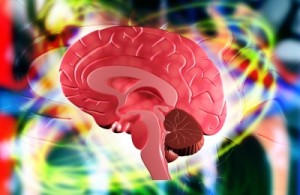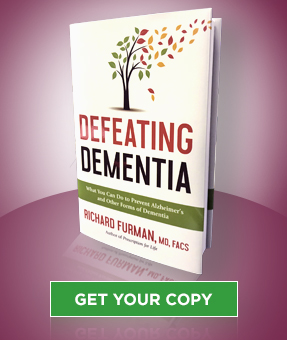 Having a stroke is not the only problem arising from blocked arteries in the brain. The same process also results in dementia. Dementia is a terrible way to spend the last five to ten years of your life. Is there anything you can do to prevent it? Or is it just something that happens as you get older?
Having a stroke is not the only problem arising from blocked arteries in the brain. The same process also results in dementia. Dementia is a terrible way to spend the last five to ten years of your life. Is there anything you can do to prevent it? Or is it just something that happens as you get older?
What if I were to tell you that there are ways that you can reduce your chance of dementia by 60% – read on!
The two most common forms of dementia are Alzheimer’s disease and vascular dementia.
Vascular dementia is caused by the damage done to arterial walls due to the negative affects of LDL cholesterol. Look at it this way: when you block portions of the arteries in your brain, you are decreasing the blood flow through that vessel. If you’re drinking a glass of water through a straw and you crimp that straw, the flow of water diminishes. When you consider all the nutrients necessary to keeping the brain’s memory functioning properly, your brain tissue is going to falter if you block a significant portion of blood flow.
Alzheimer’s is known to be a degenerative problem within the brain. True Alzheimer’s is associated with having an unusual type of protein found within the tissues of the brain. I go into great detail in “Prescription for Life” to help you understand the distinction, yet the bottom line is that more and more studies are showing an association between arterial disease and Alzheimer’s.
Significant studies show that there is a correlation between dementia and personal health choices. What is good for the heart is good for the brain. Especially, exercise!
One ground-breaking study evaluated the benefits of different levels of exercise to the brain. Vigorous aerobic exercise, included jogging, playing handball, and similar activities in which you are moving constantly with sustained heart rate elevation. Moderate exercise, included swimming, bicycling, hiking, and tennis. All these are excellent exercises, but they don’t sustain your heart rate elevation as much as vigorous exercise. As for light exercise, walking, dancing, bowling, gardening, horseback riding, and golfing were included. (If they are counting golfing as exercise, I assume the participants were walking and pulling their clubs.)
The study showed that the more physically active the participants were, the lower the risk for developing Alzheimer’s. Those who exercised the most had a 48% lower risk for Alzheimer’s disease. Even for those who were in the light exercise group, it was helpful because the study found a gradual decrease in Alzheimer’s as the exercise increased in intensity and length of time. So even if you are just starting out on your exercise lifestyle, you are actually working on improving your chances of not developing dementia.
Additionally, individuals who adhered to a fruit, vegetable, cereal, and fish diet—as compared to the ones who ate the meat and dairy products—had a 40% percent less chance of developing Alzheimer’s. What is most exciting is that if you include both exercise and a healthy diet, you will be even more protected against Alzheimer’s. There was a 60% reduced risk shown by doing both!
The “Prescription for Life” plan will help you learn to do the things that are good for the heart and good for the brain!
“Brain” photo courtesy of dream designs at freedigitalimages.net
